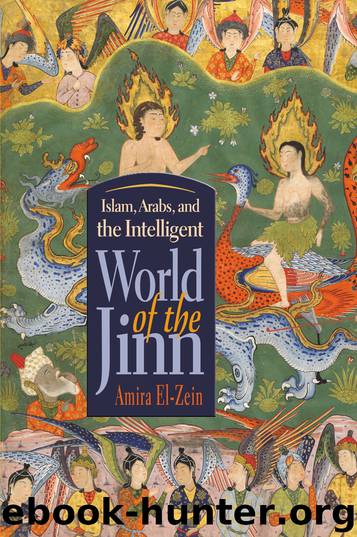Islam, Arabs, and Intelligent World of the Jinn by El-Zein Amira;

Author:El-Zein, Amira;
Language: eng
Format: epub
Publisher: Syracuse University Press
Published: 2017-10-06T16:00:00+00:00
7
Love Between Humans and Jinn
O doctor of the jinn, woe unto you, find me a cure, for
the doctor of humans is helpless against my ill.
—MAJNUN LAILA, seventh-century Arab poet1
Love between humans and jinn could be considered one of the most extravagant and intriguing aspects in the two species’ interaction. This particular theme fascinated Muslims in medieval times. Aberrant love affairs between jinn and humans circulated, creating fear, and flaring the curiosity of all classes of the society. Writers from the three layers of Islam—Orthodox, popular, and Sufi—were equally drawn toward this topic. All of them extensively wrote on it. The corpus they generated is one of the most original and captivating materials written on human/spirit love affairs across cultures. It was, though, the most difficult thing to deal with. Religious leaders strove to put down laws to control these alleged and dangerous relations. But the public remained immensely entranced by these strange narratives.
LOVE STORIES BETWEEN JINN AND HUMANS IN PRE-ISLAM
In pre-Islam, a jinni who loved a woman or a jinniyah who loved a man would take on a human form, and sometimes an animal form. They were called tabi‘, “follower,” masculine, or tabi‘ah, feminine, from the Arabic root t.b‘, meaning “to follow.” It was alleged these spiritual entities would always follow the human they loved, whether the latter was aware of their presence or not. People thought if the jinn were pleased with humans they, in return, would teach them the arts of medicine and the art of war, especially how to make fine swords. For example, in one account, we are told “a certain jinni, called Manzur, loved a woman from the humans, called Habbah. He befriended her and taught her the arts of healing.”2
The notion jinn would offer humans their knowledge in return is noteworthy. Before Islam, people supposed knowledge came from gods or spirits; that humans had to seek it outside of themselves. Two branches of knowledge specifically interested them: healing and the art of war. Rampant disease took an enormous toll on people’s lives. Pre-Islamic Arabs thought supernatural beings such as the jinn had power over death and sickness. The continual state of war was devastating. As one tribe commenced a truce with a neighboring kingdom, another tribe declared war somewhere in the Arabian Peninsula.
Love between humans and jinn was often linked to the belief jinn could dwell in some animals, as previously discussed. People maintained jinn dwell especially in deer. Pre-Islamic Arabs firmly believed deer were sacred animals. It was claimed goddess al-‘Uzza was worshiped surrounded by deer as her sacred animals.3
The most notorious of pre-Islamic myths related to love and animals is undoubtedly that of the Arab Queen Balqis from Yemen. This myth recounts that
Balqis’s father, a king named al-Hadhad, went one day to hunt the deer. He encountered a flock of deer but didn’t kill them. The king of the jinn appeared to him and thanked him for preserving the lives of his people, the jinn, who were thought to dwell in these “sacred” animals.
Download
This site does not store any files on its server. We only index and link to content provided by other sites. Please contact the content providers to delete copyright contents if any and email us, we'll remove relevant links or contents immediately.
The History of Jihad: From Muhammad to ISIS by Spencer Robert(2621)
Nine Parts of Desire by Geraldine Brooks(2361)
The Turkish Psychedelic Explosion by Daniel Spicer(2355)
The First Muslim The Story of Muhammad by Lesley Hazleton(2268)
The Essential Rumi by Coleman Barks(2043)
1453 by Roger Crowley(2023)
The Last Mughal by William Dalrymple(1855)
Trickster Travels: A Sixteenth-Century Muslim Between Worlds by Davis Natalie Zemon(1847)
Muhammad: His Life Based on the Earliest Sources by Martin Lings(1644)
God by Aslan Reza(1639)
by Christianity & Islam(1628)
A Concise History of Sunnis and Shi'is by John McHugo(1567)
No God But God by Reza Aslan(1540)
Magic and Divination in Early Islam by Emilie Savage-Smith;(1533)
The Flight of the Intellectuals by Berman Paul(1501)
Nothing to Envy by Barbara Demick(1445)
Art of Betrayal by Gordon Corera(1429)
What the Qur'an Meant by Garry Wills(1391)
Getting Jesus Right: How Muslims Get Jesus and Islam Wrong by James A Beverley & Craig A Evans(1340)
